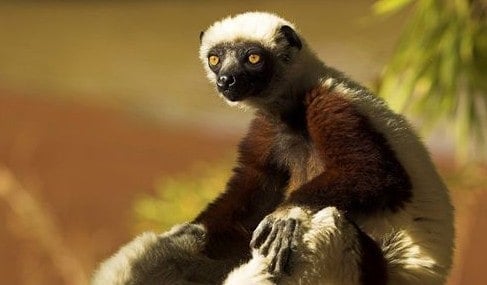Madagascar is world famous for its unique animals, many of which are protected by law, but recent research has demonstrated that illegal hunting of these protected species may be widespread and pose an urgent threat the country’s globally important biodiversity.
Research by a team from Bangor University and the Malagasy organization Madagasikara Voakajy, reported in the Dec. 14 issue of PLoS ONE, suggests that hunting of protected species in eastern Madagascar is increasing due to rapid social change, as appetites for meat increase and traditional taboos protecting the species, especially lemurs, become less powerful.
“Our observations suggest that young men have more available cash and leisure time due to the transition from subsistence farming to panning for gold, and they spend more time in local bars, eating fried meat snacks with their drinks,” said Julie Razafimanahaka from Madagasikara Voakajy. “Lemur hunting appears to have increased to supply this new market. The power of the taboo is declining, under pressures of globalization and human mobility.”
Study author Dr. Julia Jones of Bangor University goes on to explain: “Madagascar’s amazing wildlife, especially its world famous lemurs, are so important for the future of the country. They are worth much more to the economy alive than as meat. I sincerely hope Madagascar is able to tackle this problem’.
Understanding the reasons for, as well as the extent of, the pressures is vital for developing appropriate measures to protect lemurs and other native species. The researchers demonstrated that people prefer to eat domestic meats such as chicken and pork over bushmeat species such as lemur, but in some cases they resort to eating wildlife because of the high cost of domestic alternatives in many remote areas.
“Improving access to alternatives would help,” said Richard Jenkins of Bangor University, one of the authors of the study. “If domestic meats could be farmed more reliably and were therefore cheaper, the pressure on wild species may be reduced. More effort is needed to improve domestic animal husbandry methods and disease control in rainforest areas.”
Although Madagascar has a clear system of wildlife laws, understanding of these laws is poor and enforcement is weak in many areas. The project has worked with the government of Madagascar on an education campaign to help people know about the law and to ensure people understand just how vulnerable the rare lemurs are to hunting. Perhaps the campaign will result in new social norms to replace the rapidly eroding traditional taboos.
Citation: Jenkins RKB, Keane A, Rakotoarivelo AR, Rakotomboavonjy V, Randrianandrianina FH, et al. (2011) Analysis of Patterns of Bushmeat Consumption Reveals Extensive Exploitation of Protected Species in Eastern Madagascar. PLoS ONE 6(12): e27570. doi:10.1371/journal.pone.0027570
Financial Disclosure: The work was funded by the United Kingdom government Darwin Initiative (grant 17-1127) (http://darwin.defra.gov.uk/), Disney Wildlife Conservation Fund (http://disney.go.com/disneyhand/environmentality/dwcf/apply.html), National Geographic Society (http://www.nationalgeographic.com/field/grants-programs/cre-application.html), IUCN Netherlands (http://www.terravivagrants.org/Home/funding-news/new-and-changed-grants-programs/iucnnetherlandssmallconservationgrantsin2011), Rufford Foundation (http://www.rufford.org/) and SeaWorld and Busch Gardens (http://www.swbg-conservationfund.org/). The funders had no role in study design, data collection and analysis, decision to publish, or preparation of the manuscript. Ambatovy Minerals provided some matched funding to the authors’ project on the condition that the authors included areas covered by their mine in the study. However, they did not have any involvement in the design of the survey or in selecting specific study villages (just the communes in which the authors were to work; communes are large administrative units coveringmany 1000s of people). Conservation International similarly had no involvement in the design of the study or selecting of study villages or households. However, they also provided funding to the project on the condition that the authors included communes within their zone of intervention around a new protected area.
Competing Interest Statement: The authors have read the journal’s policy and have the following conflicts to declare: The authors received funding from a commercial source (Ambatovy minerals) during this study. Ambatovy funded some of the field work (although less than 10% of the total) and Ambatovy are funding some ongoing work on bushmeat hunting by the authors. The authors have full support from Ambatovy (and the authors’ other funders) in making the anonymised data fully available. The support from Ambatovy does not alter the authors’ adherence to all the PLoS ONE policies on sharing data and materials. There are no patents, products in development or marketed products to declare.
PLEASE LINK TO THE SCIENTIFIC ARTICLE IN ONLINE VERSIONS OF YOUR REPORT (URL goes live after the embargo ends):
http://dx.plos.org/10.1371/journal.pone.0027570
Disclaimer: This press release refers to upcoming articles in PLoS ONE. The releases have been provided by the article authors and/or journal staff. Any opinions expressed in these are the personal views of the contributors, and do not necessarily represent the views or policies of PLoS. PLoS expressly disclaims any and all warranties and liability in connection with the information found in the release and article and your use of such information.
About PLoS ONE
PLoS ONE is the first journal of primary research from all areas of science to employ a combination of peer review and post-publication rating and commenting, to maximize the impact of every report it publishes. PLoS ONE is published by the Public Library of Science (PLoS), the open-access publisher whose goal is to make the world’s scientific and medical literature a public resource.
All works published in PLoS ONE are Open Access. Everything is immediately available — to read, download, redistribute, include in databases and otherwise use — without cost to anyone, anywhere, subject only to the condition that the original authors and source are properly attributed. For more information about PLoS ONE relevant to journalists, bloggers and press officers, including details of our press release process and our embargo policy, see the everyONE blog at http://everyone.plos.org/media.


